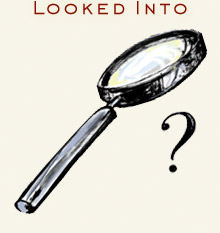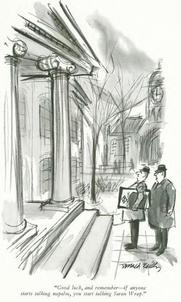Emdashes—Modern Times Between the Lines
The Basics:
About Emdashes | Email us
Ask the Librarians
Best of Emdashes: Hit Parade
A Web Comic: The Wavy Rule
Features & Columns:
Headline Shooter
On the Spot
Looked Into
Sempé Fi: Cover Art
This Is Not Your Father's Cartoon--Well, Actually, It Is
Filed under: Looked Into Tagged: Benjamin Chambers, Donald Reilly, newyorker.com

Benjamin Chambers writes:
I was astonished by the raw politics on display in this Donald Reilly cartoon when I ran across it in the December 30, 1967 issue of The New Yorker last night:
It refers to the October 1967 riots at the University of Wisconsin, when students who objected to the presence of recruiters from Dow Chemicals on campus because of the company’s role in making napalm were involved in a bloody melee with police. Apparently, David Maraniss wrote a very good book about the event, titled They Marched into Sunlight.
At first, I was surprised because I couldn’t remember another cartoon in the magazine that so explicitly named/attacked a single company. (Can Emdashes readers suggest any?) But I’m no longer certain the cartoon is as much of an indictment of Dow as I first thought.
The cartoon seems to speak from a position of comfortable distance, where the absurdity of doing spin for a company that manufactures a horrific weapon of war at the same time that it makes Saran Wrap is as much a part of the cartoon’s humor as the certainty that the Dow recruiter will be greeted with student antagonism of an entirely different order of magnitude.
In other words, what counts in the joke is the mismatch between the two men’s expectations and what the recruiter is about to encounter. One could imagine a parallel cartoon in which two Christians, about to face lions in a Roman arena, marshal their rhetoric.
What do you think?





Comments
Great stuff, B. It certainly is our fathers’ cartoon, a bracing reminder that not all politics operates along a left/right spectrum. Sometimes it’s purely generational. What’s fascinating is that this cartoon does not speak for the students, whereas in 2008, it just as surely would. Of course, it wasn’t just the magazine that changed!
I’m reminded of when I first received the Complete New Yorker, naturally one searches for anything one can think of. It’s very instructive to search on terms like “punk,” “Sex Pistols,” “Velvet Underground,” “Ramones,” “Talking Heads,” “Patti Smith,” and so on, and be met with a spooky silence, for the most part. It’s a black hole. The New Yorker didn’t “oppose” the counterculture, it failed to notice it. Then during Tina’s reign, Lou Reed has a byline! Quite a change, and quite a ways to get there.
It’s possible we underestimate how staunchly the magazine was once positioned not to recognize student perspectives as such. Discuss student perspectives—perhaps. But not identify with them in passing, as it were.
Typically perceptive comment, Martin. With regard to the magazine’s commitment to not noticing student dissent, the magazine certainly earned its reputation as staid. I plan to post about this soon, but when I searched The Complete New Yorker for fiction with the keyword “president,” I found clear trends in when the magazine seemed to engage in presidential satire — and the 1960s was not one of those periods. In fact, the only period (using this particularly gauge) that it appears to have gone in for that in a big way was in the 1980s.